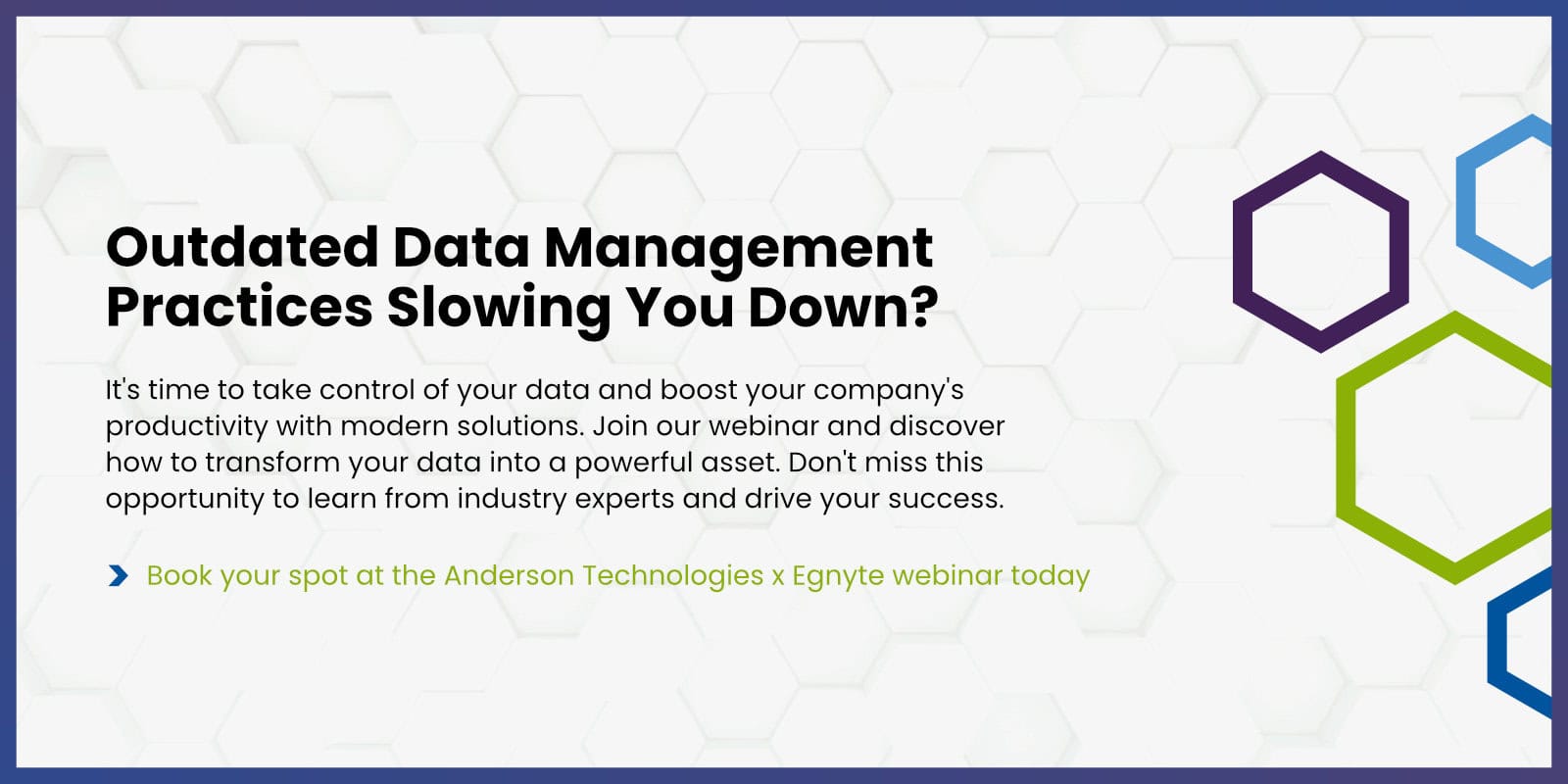
By Principal Farica Chang
Business operations feeling sluggish? It might not just be the market—inefficient data management practices could be silently draining your company’s productivity and profitability. Many organizations don’t realize the extent to which outdated or poorly structured data systems are affecting their bottom line. From unnecessary risks in security to missed opportunities for collaboration, the price of overlooking data handling could be holding your business back.
Let’s reframe how you think about data management. Learn what’s involved, what common errors you might unknowingly be making, and discover a more effective approach to securing and leveraging your most valuable asset.
What Does Data Management Entail?
Data management involves a comprehensive set of practices designed to ensure optimal handling, security, and utilization of data across an organization. It’s a multifaceted discipline which includes:
- Data Storage and Organization: Storing data in a structured manner to ensure it can be accessed, used, and managed efficiently.
- Data Security: Implementing robust measures to protect data from unauthorized access and cyber threats.
- Data Quality Management: Ensuring the accuracy, completeness, and reliability of the data throughout its lifecycle.
- Data Compliance: Adhering to relevant laws and regulations regarding data privacy and protection.
- Data Integration: Seamlessly combining data from different sources to provide a unified view that supports better decision-making.
- Data Accessibility: Making data easily accessible to stakeholders while ensuring sensitive information remains secure.
Understanding and implementing each of these aspects properly is crucial for any business aiming to use their data for strategic decision-making, operational improvements, and securing a competitive advantage.
Before we explore how to do that, though, let’s first examine some of the common errors in data management. How many are you guilty of?
Problem 1: Inadequate Security Measures That Open the Door to Cybercriminals
In a world where data breaches aren’t just common, but expected, inadequate security measures stand as a key issue for many businesses. The consequences of such breaches are severe, ranging from financial losses due to downtime and compliance penalties to .
Despite this, plenty of businesses still underestimate the sophistication of cyber threats, relying on outdated security protocols or incomplete data management solutions. This misstep can lead to disastrous data breaches, exposing sensitive customer information, and even inflicting irreparable damage on a company.
The complexity of modern cyber threats requires a tailored, up-to-date security strategy that many companies simply fall short of.
Problem 2: Poor Data Accessibility That Disrupts Team Collaboration
A significant faux pas in many companies is persisting with clunky, disparate systems for data storage and organization. Collaboration, especially in an era where remote work has become prevalent, needs to be supported by structures that enable swift access to, and smooth sharing of, information—yet all too often, key data is fractured across multiple incompatible platforms.
Inefficient systems not only slow down project progress, but also lead to frequent miscommunications and data silos. This lack of streamlined collaboration tools impairs productivity and can cause projects to stall, which negatively impacts business efficiency and employee satisfaction.
Maximize Data Value and Minimize Risk with Egnyte
Problem 3: Inefficient Data Lifecycle Management That Impairs Decision-Making
Data lifecycle management remains a challenge, with companies often finding it difficult to handle the sheer volume and variety of data in their care efficiently. If client and sales information is lost, forgotten, or incomprehensible, your overall datasets become unreliable and inaccurate. Ultimately, this hinders your capacity for informed decision-making and effective strategy development.
Without a structured approach to managing the flow of data from creation to deletion, organizations find themselves grappling with data bloat, compliance issues, and unnecessary costs associated with storing irrelevant or outdated information. With the increasing prevelance of artificial intelligence tools designed to learn from and provide answers to employees using the historical data stored, it is more important than ever to create a strategy to handle aging and irrelevant files.
Successful lifecycle management requires both strategic foresight and the right technological tools—components often missing in traditional approaches to data handling.
How Modern and Effective Data Management Solutions Address These Issues
What Are the Best Tools for Data Management?
-
Enhancing Security
Modern data management platforms utilize advanced security features to safeguard data, including:
- Two-factor authentication
- End-to-end encryption
- and Rigorous access controls.
When combined, these protective measures make it harder for unauthorized individuals (like hackers) to gain access to your confidential information, thereby mitigating the chance for data breaches.
-
Streamlining Collaboration
By integrating cloud-based platforms, businesses can collate their data sources into one user-friendly workspace, significantly boosting their team’s collaborative abilities. These platforms support real-time document editing, version control, and provide delay-free access to files from any device and location. In place of communication breakdown, you get enhanced workflow efficiency and team productivity.
-
Simplifying Data Lifecycle Management
The latest data management solutions offer sophisticated tools for automating the data lifecycle. From creation to deletion, these features help manage data in line with compliance policies and regulations, thus reducing the overhead related to manual data handling and storage (and the potential for legal fines). With better data management and data you can rely upon, it becomes much easier to get the most out of it using manual and automated data analytics tools. This way. Data management moves from being a failing to your forte!
Choosing the best tools for data management can be a challenge. Enter Egnyte—a standout platform that excels in fortifying data security, ensuring compliance, and boosting operational efficiency. Let’s examine how Egnyte’s innovative features can revolutionize the way your business handles data, making every aspect of management smoother and more secure.
Intelligent Content Platform
Egnyte’s Intelligent Content Platform harnesses AI-powered solutions that make content management easier and more compliance-friendly. This platform allows businesses to manage their data in a smarter way; through automation and insightful analytics, data handling becomes a strategic asset rather than an operational headache.
Advanced Security and Granular Permissions
Egnyte provides advanced security measures, including sophisticated access governance. This allows for granular permission controls. In other words, it ensures that only the right personnel have access to sensitive data, thus maintaining the strict data integrity and confidentiality your clients expect.
Industry-Specific Solutions
Egnyte offers customized solutions tailored to industries like Architecture, Engineering, and Construction (AEC), Life Sciences, and Financial Services. This specialization means that unlike other data management and file sharing platforms which only meet general business needs, Egnyte also addresses sector-specific challenges and compliance requirements. You can say goodbye to the barrier many teams face when trying to achieve appropriate and effective data management for their field.
Lifecycle Management
Understanding and implementing efficient data lifecycle management is also facilitated by Egnyte, which provides tools to reduce complexity and mitigate risks throughout the data’s entire lifecycle. This ensures that businesses can handle their data more wisely and in a cost-effective manner.
Discover More at Our Upcoming Webinar
Looking to delve deeper into how these solutions can be applied to your operations? Attend our upcoming webinar!
Hosted by Egnyte in collaboration with Anderson Technologies, this 45-minute session will explore real-life case studies, provide practical insights from various industries, and offer live interaction with experts to address your specific questions and needs.
Whether you’re battling with data security issues, looking for better ways to collaborate, or needing a more robust approach to data lifecycle management, our webinar will provide the guidance you need to make informed decisions that can significantly improve your operational efficiency and data handling capabilities.
Don’t miss the chance to transform your data into one of your most powerful assets — join us to learn more about how Egnyte can help you master data management.



